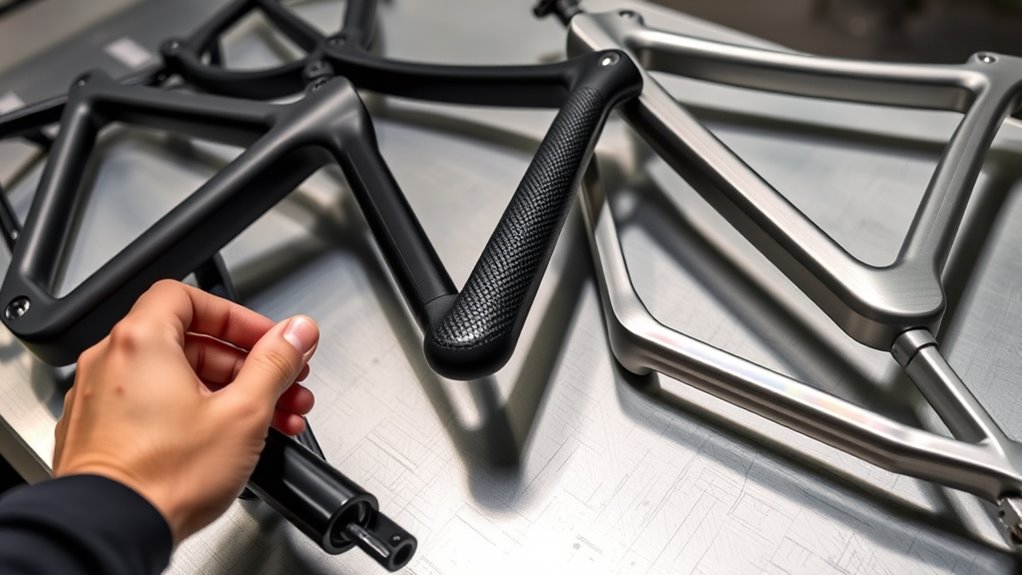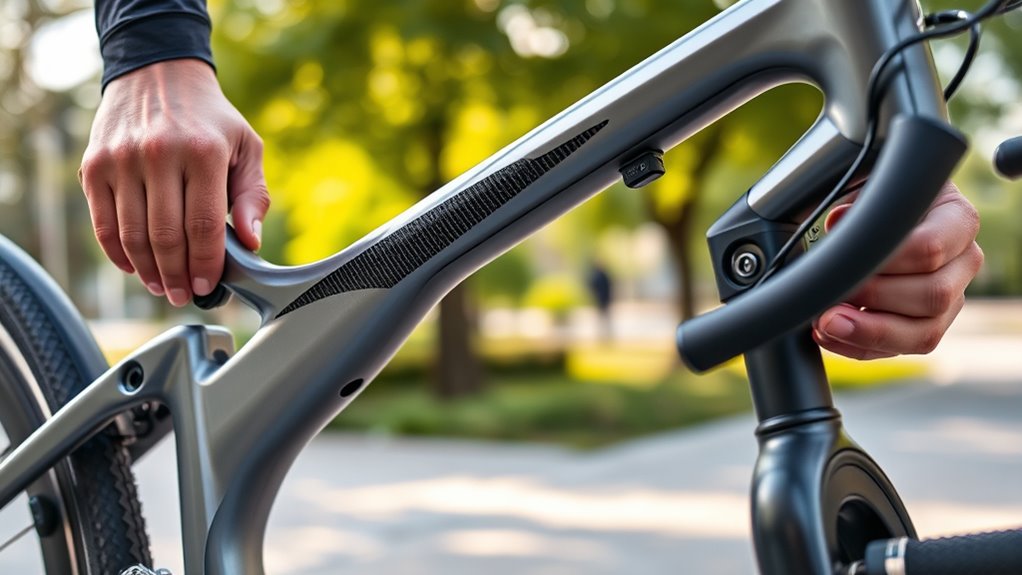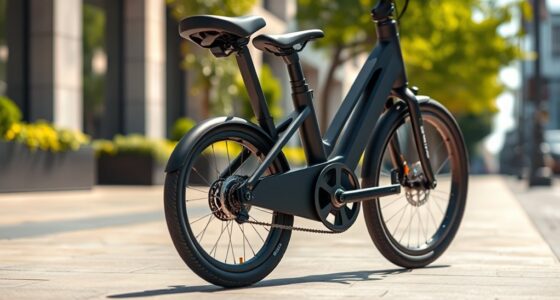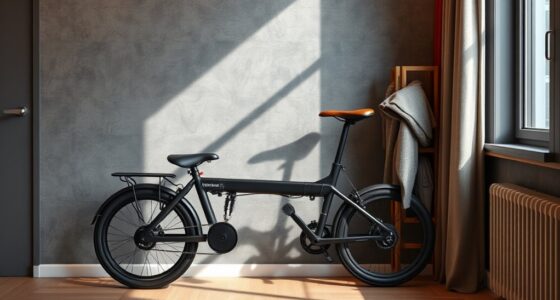When choosing a folding e-bike frame material, consider your riding style, budget, and durability needs. Aluminum offers a lightweight, affordable option with good strength and corrosion resistance, making it versatile for commuting and casual rides. Steel provides exceptional toughness and shock absorption but adds weight and cost, ideal if durability is your priority. Carbon fiber delivers the lightest, high-performance ride but is more fragile and pricey. If you want to understand more about making the best choice, keep exploring the details.
Key Takeaways
- Consider your riding style and terrain to determine if lightweight carbon or durable steel suits your needs.
- Balance your budget with frame material to find the best combination of cost, weight, and durability.
- Evaluate the bike’s intended use—commuting, off-road, or performance—to select the appropriate material.
- Opt for aluminum if you want a lightweight, corrosion-resistant frame with good strength and affordability.
- Prioritize steel for maximum durability and repairability, especially if riding rough terrains or needing long-term resilience.

When selecting a folding e-bike, the frame material plays a essential role in determining the bike’s weight, durability, and ride quality. Your choice impacts how the bike feels during rides, how well it holds up over time, and how much you’ll need to invest upfront. Understanding the balance between frame durability and material cost helps you make a smarter decision that aligns with your riding needs and budget.
Aluminum is a popular option for folding e-bikes because it offers a great mix of light weight and strength. Its frame durability is solid enough for everyday commuting and casual rides, and it resists corrosion, which is critical if you often ride in wet conditions. Plus, aluminum frames tend to be more affordable compared to other materials, making them an attractive choice if you’re budget-conscious. While aluminum may not be as stiff as steel, modern manufacturing techniques have improved its strength, so it can handle regular use without cracking or bending easily.
Aluminum frames offer a lightweight, durable, and affordable option perfect for everyday commuting.
Steel frames, on the other hand, excel in frame durability. They’re renowned for their toughness and ability to absorb shocks, giving you a smoother ride over rough surfaces. Steel is also highly repairable; if your frame sustains damage, it can often be fixed rather than replaced. However, steel tends to be heavier, which can affect portability and overall ride feel. Its material cost is generally higher than aluminum, but many riders find the added durability worth the extra expense, especially if they plan to keep the bike for years or ride in challenging conditions.
Carbon fiber frames are the lightest and stiffest option, offering superior ride quality, especially if you value agility and performance. They provide excellent frame durability in terms of fatigue resistance, but they’re more fragile under impacts like crashes or heavy knocks. The material cost for carbon fiber is considerably higher, often making it less accessible for casual riders. If your priority is a lightweight, high-performance folding e-bike and you’re willing to invest, carbon fiber can be an excellent choice. But keep in mind, its fragility relative to steel and aluminum means you’ll need to handle it with care.
Ultimately, your decision hinges on your riding style, durability needs, and budget. If you want a reliable, affordable option that’s easy to carry, aluminum strikes a good balance. If durability and toughness are top priorities, steel might be the better choice despite the added weight and cost. For those seeking a lightweight, high-performance ride and willing to pay a premium, carbon fiber offers unmatched lightness and stiffness. Additionally, the availability of advanced manufacturing techniques enhances the durability of aluminum frames, making them a versatile choice for many riders. By weighing these factors thoughtfully, you’ll pick a frame material that enhances your riding experience and fits your lifestyle.
Frequently Asked Questions
How Does Frame Material Affect Bike Weight and Portability?
Frame material directly impacts your bike’s weight and portability. Lighter materials like aluminum make your e-bike easier to carry and store, enhancing portability. They also offer good frame durability, ensuring your bike withstands daily use. Some materials, like steel, add aesthetic appeal with a sleek look but tend to be heavier, reducing portability. Choose a material that balances lightweight design with durability and visual appeal to suit your riding needs.
What Maintenance Is Required for Different Frame Materials?
Think of your bike’s frame as a garden that needs tending. Aluminum frames require little maintenance, just occasional cleaning to prevent corrosion. Steel frames might need regular inspections for rust and possible repainting, making repairs easier if damage occurs. Carbon frames demand gentle handling and cleaning with soft materials to avoid damage. Proper maintenance guarantees your bike stays durable, repairable, and corrosion-free, keeping it ready for your next adventure.
Are Certain Materials More Environmentally Sustainable Than Others?
You’ll find that aluminum and steel frames are generally more environmentally sustainable due to eco-friendly manufacturing processes and high recyclability. Aluminum is lightweight and easy to recycle, reducing energy use, while steel’s durability means less waste and longer lifespan. Some carbon fiber frames may be less sustainable because of energy-intensive production, but they are still recyclable. Prioritizing materials with good recyclability and eco-friendly manufacturing helps minimize your bike’s environmental impact.
How Do Frame Materials Influence Riding Comfort and Ride Quality?
Think of your bike as a dance partner, moving smoothly with you. The frame material directly affects ride comfort and quality, influencing how vibrations are absorbed and how stable you feel. Lightweight materials like aluminum offer a lively ride, while steel provides more dampening for a softer feel. Durable frames guarantee long-term performance, and material aesthetics add to your bike’s personality. Your choice shapes your riding experience like a finely tuned melody.
Can Frame Material Choice Impact the Bike’s Resale Value?
Yes, your choice of frame material can impact your bike’s resale value. A durable frame made from high-quality materials like aluminum or carbon fiber maintains its condition longer, boosting resale appeal. Additionally, a frame with aesthetic appeal attracts more buyers. When you select a material that combines durability and looks, you’re more likely to get a better price if you decide to sell your folding e-bike later.
Conclusion
Choosing the right frame material really influences your folding e-bike’s durability, weight, and ride quality. Did you know that aluminum frames are about 30% lighter than steel, making your rides easier and more convenient? By considering your commuting needs and terrain, you can pick the perfect material that balances strength and portability. Ultimately, investing in the right frame guarantees your e-bike stays reliable and enjoyable for years to come—so choose wisely and ride confidently!









